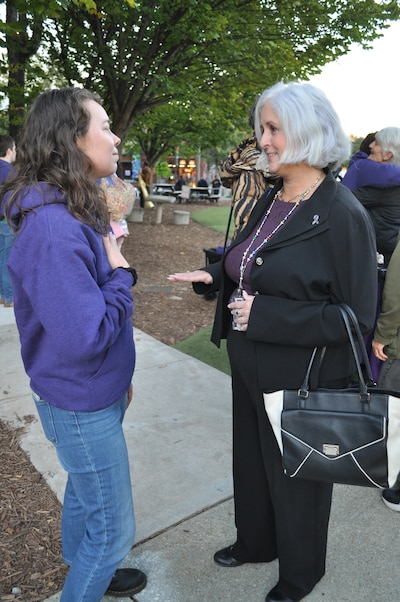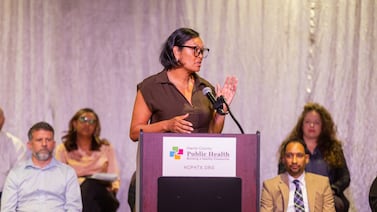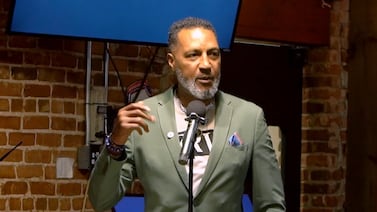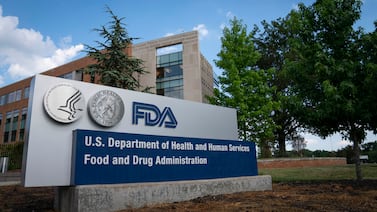Public health, explained: Sign up to receive Healthbeat’s free Atlanta newsletter here.
Seeing a spike in police reports of domestic violence in the first half of this year, Atlanta Mayor Andre Dickens’ office started a publicity campaign urging people to help when they see signs of the crime.
While advocates working to end domestic violence say the “Atlanta Says No More” effort brings welcome attention to the issue, significant change takes a lot more work – and collaboration from experts in the community with decades of experience.
Domestic violence is a public health threat with economic instability, youth mental illness, firearm access, and alcohol and substance use disorders all contributing – systemic issues that can be addressed by federal, state, and local policymakers with the right information.
In 2023, the state saw 163 deaths related to domestic violence – 92 victims, 27 bystanders and 44 perpetrators, according to the Georgia Commission on Family Violence.
“There is so much knowledge and wisdom in the community, in the metro Atlanta area, from working with survivors for decades,” said Kyra Hanlon-Batiste, community engagement director for the Women’s Resource Center to End Domestic Violence in Decatur, who learned of the city campaign through an Instagram post.
“Any effort that is not grounded on survivor-centered knowledge and solutions is not going to be sustainable or successful,” she said.
The mayor’s office started the campaign in June, after internal data from the Atlanta Police Department showed there had been 76 more reports of domestic violence than the same time the year before, said Marcus Walker, director of the Mayor’s Office of Violence Reduction.
Walker said the mayor wanted to find out why this was happening and what the city could do to address the problem.
“We said, ‘We don’t want that number to grow,’” he said.
The city moved quickly to launch the campaign, but Walker said the office does want to work more closely with local groups on domestic violence going forward.
“We know that those are the subject-matter experts, and we want to make sure that we’re leveraging all their expertise and knowledge,” he said.
Katha Blackwell, president and CEO of the Atlanta-based Partnership Against Domestic Violence, said the city told her staff about the campaign before it launched but didn’t ask for their advice in planning it.
Groups like hers can help government leaders better understand obstacles that can come up for survivors, she said, like being unable to find a new apartment away from a dangerous environment or having sufficient protection from an abuser.
Blackwell said she’s happy the mayor’s office is focused on addressing domestic violence, as elected officials’ buy-in is crucial. She said it would be helpful for the city to create opportunities for survivors to share their stories, plan initiatives with service agencies and prevention groups, better protect survivors from their abusers, and increase funding for organizations that address the problem.

The city provides the partnership with about $250,000 a year, an amount that reflects an increase over the past few years. But the group still hasn’t always been able to meet all the needs.
“It’s frustrating because we know the need is there,” Blackwell said.
October is Domestic Violence Awareness Month, when the Women’s Resource Center holds its annual candlelight vigil. The event honors those who have died and supports those who have survived, acknowledging their long-term consequences, often in the form of health problems like increased risk of chronic diseases.
Destiny McFarland stood at a podium atop Decatur Square at Thursday’s vigil and spoke about her and her daughter’s experiences with violence in their home.
“I didn’t leave the first time I was hit, nor did I learn the importance of self-love and worth in the first unhealthy relationship,” she said. “Many times it took me. And graciously, I met this test.”
Ayonna Johnson, the center’s legal services director, tasked the audience and the greater Atlanta community with remembering the victims while focusing on future action.
“The greatest tribute that we can give them is our commitment to a world where this violence no longer exists,” Johnson said.
The city’s campaign asks Atlantans to do at least one thing to prevent domestic violence encounters — whether that’s emotionally supporting the survivor of an assault or volunteering with a local resource center.
Some of its messages read: “Don’t ignore it.” “Tell someone they matter.” “No more excuses. No more silence. No more violence.”
Walker said the rate of domestic violence reports hasn’t changed much since June, but his office has received more calls from survivors who want to share their stories.
“We want to see that awareness turn into action,” he said, calling on community leaders to spread the city’s messages.
Sangmi Kim, an Emory University assistant nursing professor and co-chair of the school’s Violence Prevention Task Force, said that through policy, governments can create an environment where the risk of violence at home is lower.
Kim said efforts shouldn’t be reliant on police report increases of a notoriously underreported crime.
“It really redirects our attention to something else less important,” Kim said. “[The] more important thing is that, no matter what statistics say, it has always been high.”
Where to find help
- Georgia Statewide Domestic Hotline: 1-800-33-HAVEN
- Statewide Spanish Hotline (operated by Cherokee Family Violence Center): 770-720-7050
Local Domestic Violence Shelters
- Partnership Against Domestic Violence (Atlanta)
Main line: 1-404-873-1766 - Women’s Resource Center To End Domestic Violence (Decatur)
24-Hour Hotline: 1-404-688-9436 - Clayton County Association Against Family Violence (Morrow)
Crisis line: 1-770-961-7233
This story has been updated to correct the name of the task force co-chaired by Sangmi Kim.
Allen Siegler is a reporter covering public health in Atlanta for Healthbeat. Contact Allen at asiegler@healthbeat.org.






